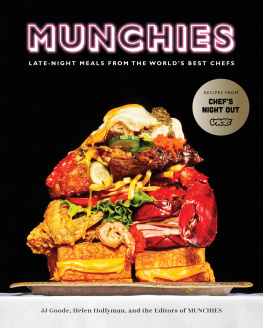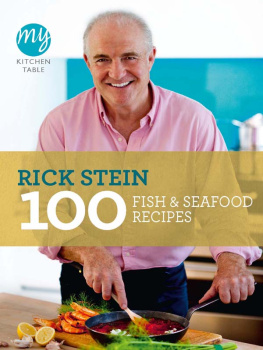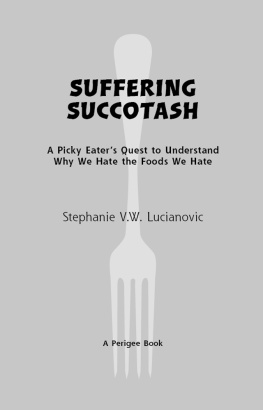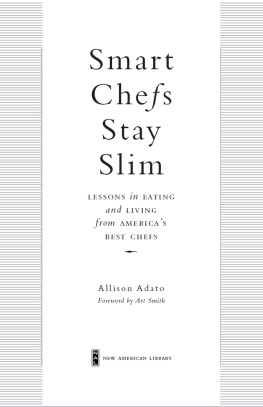HOUGHTON MIFFLIN HARCOURT
BOSTON NEW YORK
2010
Copyright 2010 by Melanie Rehak
All rights reserved
For information about permission to reproduce selections from this book,
write to Permissions, Houghton Mifflin Harcourt Publishing Company,
215 Park Avenue South, New York, New York 10003.
www.hmhbooks.com
Library of Congress Cataloging-in-Publication Data
Rehak, Melanie.
Eating for beginners : an education in the pleasures of food
from chefs, farmers, and one picky kid / Melanie Rehak. p. cm.
ISBN 978-0-15-101437-8
1. Gastronomy. 2. Cookery. 3. Applewood Restaurant
(Brooklyn, New York, N.Y.) 4. Rehak, Melanie. I. Title.
TX633.R45 2010
641'.013dc22 2009047467
Book design by Victoria Hartman
Printed in the United States of America
DOC 10 9 8 7 6 5 4 3 2 1
Lines from "A Winter's Tale" by Wyatt Prunty appear courtesy of the author. "A Little
Madness in the Spring" is reprinted by permission of the publishers and the Trustees of
Amherst College from The Poems of Emily Dickinson, Thomas H. Johnson, editor, Cambridge,
Mass.: The Belknap Press of Harvard University Press, copyright 1951, 1955,
1979, 1983 by the President and Fellows of Harvard College. Lines from "Variations: The
Air Is Sweetest That a Thistle Guards," edited by J. D. McClatchy and Stephen Yenser,
copyright 2001 by the Literary Estate of James Merrill at Washington University, from
Collected Poems by James Merrill, edited by J. D. McClatchy and Stephen Yenser. Used
by permission of Alfred A. Knopf, a division of Random House, Inc. Lines from "Reluc
tance" from The Poetry of Robert Frost, edited by Edward Connery Lathem. Copyright
1934, 1969 by Henry Holt and Company. Copyright 1962 by Robert Frost. Reprinted
by arrangement with Henry Holt and Company, LLC.
To protect the privacy of individuals, pseudonyms are used
for the kitchen staff at applewood restaurant.
for Noah
My subject is my place in the world.
WENDELL BERRY
Contents
Introduction
1. IN THE BEGINNING
2. WE EAT WHAT WE ARE
Candied Orange Peel
Jicama Slaw
3. WHAT IS CHEESE?
4. SCHOOL FOR CHEFS
Oblique-Cut Caramelized Parsnips
5. MEET THE FARMER
Puffed Cayenne Rice
Corn Off the Cob with Garlic
6. LUCKY ME, LUCKY YOU
Lucky Dog Creamed Spinach
7. INTO THE FRYING PAN
Easy Flip Raisin French Toast
Not So Easy Flip Crab Cakes
8. ONE FISH, TWO FISH
Lobster l'Amricaine la Steve and Melanie
Pasta with Delicata Squash, Sage, and Pine Nuts
9. NIGHT SHIFT
10. RICH IN IMPERFECTIONS
Brined Turkey
Jean's Brussels Sprouts
11. AWAY IN A MANGER
Pasta with Bacon, Farm-Fresh Eggs, and Cream
Lucy's Osso Bucco
12. FARM TO CLEAVER
No-Grill Pork Tenderloin with Balsamic Vinegar
13. OUT TO SEA
Pan-Roasted Sardines with Caper Butter
Seasickness Cure
14. SWEETNESS AND LIGHT
Under the Bed Almond Cookies
Melanie's Prune Bread Pudding
Acknowledgments
Introduction
A few months after my son Jules turned one, I started working in the kitchen of a small restaurant down the street from my apartment in Brooklyn, New York, called applewood (the lowercase a being a choice the owners hoped would convey plenty in contrast to the sharp, aggressive point of the capital A they had forgone). This unexpected move prompted various raised eyebrows and one miscommunication that resulted in several of my husband Noah's friends thinking I had gone belly up as a writer and needed alternate employment to help keep the family afloat. At a moment when many new mothers marvel at how quickly time passes or weep over outgrown onesies and booties, I instead endeavored to become, as the great food writer M. F. K. Fisher referred to herself in 1943, "the gastronomical me."
It was not, however, because I felt pangs of longing for the tiny (screaming, incomprehensible) baby who was gone forever. Nor did I do it because I had long harbored a secret desire to be on Top Chef, win thanks to my brilliant use of okra in all five courses of a meal including dessert, and open my own restaurant in a blaze of media glory.
I did it because I needed an education. The one I already had, which had served me quite well for some decades both professionally and personally, had lately begun to seem outdated. This was partly because of Jules. Though no one tells you until after the fact, every new parent experiences some variation of this feeling: one day you're a responsible adult with a clear grip on the details of your life and how they function; the next, you wake up to whole constellations of problems that you've not only never dealt with before, but had no idea even existedexploding diapers, sleep schedules, an ever-present epaulet of spit-up on all your shirts that you don't notice until you've already left the house, and so on. And in spite of the host of experts (and their books and magazine articles and web sites) who seem to arrive with every new baby in the twenty-first century, there is always a question hovering in the air: Which of these thingsyou and the baby sleeping, you and the baby wearing clean clothes, you and the baby doing or not doing something you don't even know about yetactually matter?
And then Jules grew old enough to eat solid food. Just as I was moving out of the confusion about layering his clothing and teething signs and why he crawled backwards first, I encountered a whole new set of choices I was unequipped to make. In short: What was he supposed to eat?
This was a question I had already been asking myself for some time, and it represented the other area in which my education seemed to be failing me. Eating, as it happened, was a subject in which I had been interested long before having a baby. Before I ever cracked any books with titles like The Seven Sleep Habits of Highly Effective Infants, I was cuddling up at night with Julia Child and James Beard and Mark Bittman and falling asleep with visions of roasts and sauts dancing in my head. None of which is to say that I was a genius in the kitchen. I was a pretty good cook if not necessarily an inspired one. I was game for almost anything and I liked to throw dinner parties, but I was also happy eating an egg-and-cheese sandwich from a cart on the street. I patronized greenmarkets and was (and am) a long-time fan of numerous unpopular vegetables, like Brussels sprouts, though I didn't (and don't) expect others to be since I personally can't stand melon of any kind.
But then, somewhere in the few years before Jules was born, my feelings about food started to change. Along with Child and Beard and Bittman, I had begun reading Michael Pollan and Eric Schlosser and Wendell Berry. Initially, I wasn't sure I wanted toI feared being lectured about what I was eating and then feeling even more guiltily ignorant than before. I resisted buying Fast Food Nation for several years, but when I finally did start it, the book quickly won me over. Not only were my concerns about its tone unfounded, but it was a pleasure to read. I was actually relieved that the train I was on when I first opened it stalled for three hours, allowing me a chunk of uninterrupted reading time. There were no lectures, only useful information and engaging narratives. Next came Pollan's The Omnivore's Dilemma and In Defense of Food, and after that Berry's What Are People For? Together, these books presented, much as my child did, a host of issues that I was first unaware of and then unsure how to prioritizeissues that often left me paralyzed in front of a produce or dairy or meat display at a supermarket or greenmarket. What, exactly, was I supposed to be buying?
Next page






